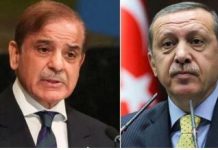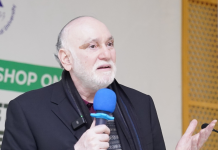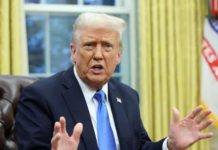LONDON: Russia’s plan to invade Ukraine would lead to the largest conflict in Europe since the Second World War, British Prime Minister Boris Johnson has warned.
Johnson said he wanted people to “understand the sheer cost in human life” that an incursion into Ukraine would bring, with casualties on both the Russian and Ukrainian sides, as he continued to urged Moscow to engage in peace talks.
Foreign Secretary Liz Truss, meanwhile, used a separate interview to state that President Vladimir Putin “will not stop at Ukraine” as she argued he is looking to piece the Soviet Union back together.
The comments came as Ukraine’s military said two soldiers died on Saturday as violence escalated in the east of the country between government forces and rebels.
There are growing fears Russia could use the increase in tension in the separatist-held region as a pretext for an attack.
The Prime Minister spent Saturday engaged in diplomatic efforts to avoid war as he warned the Kremlin during a speech at the Munich Security Conference of increased financial sanctions should Mr Putin order troops across the border.
He also told broadcasters that he believed Mr Putin’s invasion plan was “in motion” with the aggression in the Donbas region potentially a “prelude to bigger action”.
In other comments made while in Germany, Mr Johnson warned that the “sheer scale” of the offensive being prepared by Moscow had not been seen for almost 80 years.
He told BBC News: “The plan that we’re seeing is for something that could be the biggest war in Europe since 1945 just in terms of sheer scale.
“You’re looking at not just an invasion through the east through the Donbas, but according to the intelligence we are seeing, coming down from the north, down from Belarus and actually encircling Kyiv itself, as Joe Biden explained to a lot of us last night.
“I think a lot of people need to understand the sheer cost in human life that could entail, not just for Ukrainians but for Russians.”
Ms Truss, speaking to the Mail On Sunday, said the West needed to “stop” Moscow in its tracks or else otherwise Mr Putin would look to “turn the clock back to the mid 1990s or even before then” by possibly annexing the Baltic States – such as Estonia and Latvia – and the Western Balkans, which includes Serbia and Albania.
Meanwhile, Home Secretary Priti Patel warned that a conflict between Moscow and Kyiv would “not just be a foreign quarrel about which we know little”.
Writing in the Sunday Telegraph, the Cabinet minister said the “effects would be felt here too” given the UK has previously experienced Russian cyber “interference” against its media, telecommunications and energy infrastructure.
Mr Johnson held talks with a number of European leaders while in Bavaria, including meeting Ukrainian president Volodymyr Zelenskyy.
During his speech to the annual summit, Mr Zelenskyy was critical of what he called “appeasement” by the West in the face of Russian aggression.
“We have the right to demand to move from the appeasement policy to ensuring the guarantees of security,” he said, in a translation offered by the conference.
Mr Zelenskyy also questioned why western leaders were waiting for Russia to invade before applying sanctions, given 150,000 of Moscow’s troops are amassed on his country’s border,
The criticism comes as anxiety in the West increases that mounting instability in the Donbas region in Ukraine’s east, where government forces have been fighting pro-Russia rebels since 2014 in a conflict that has killed some 14,000 people, could spiral into a wider battle.
Rebel leaders announced a call to arms in the Donetsk and Luhansk region, while Ukraine’s military said two soldiers were killed on Saturday in a government-held part of Donetsk.
Top Ukrainian military officials also came under shelling attack during a tour of the conflict front, forcing them to flee to a bomb shelter.
Mr Putin and Alexander Lukashenko, the Belarus president and Moscow ally, spent Saturday watching Russian forces flex their military might during massive nuclear drills, which involved multiple practice missile launches.
It is feared the exercises are a further indication that Russia is gearing up for an offensive.

















